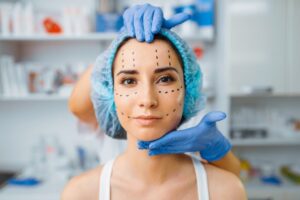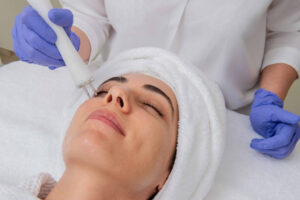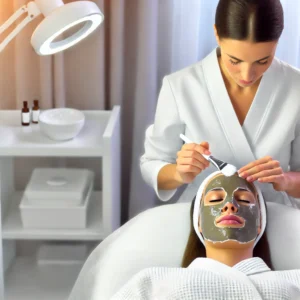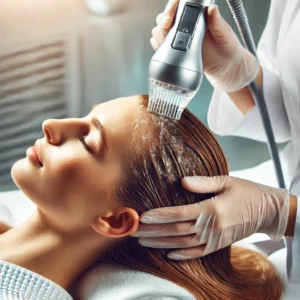Pigmentation refers to the coloring of the skin, which is determined by melanin, a pigment produced by melanocytes. Pigmentation disorders occur when there is an imbalance in melanin production, leading to uneven skin tone or dark spots. Common pigmentation issues include hyperpigmentation, melasma, age spots, and post-inflammatory hyperpigmentation (PIH).
Types of Pigmentation Issues
- Hyperpigmentation: This is when patches of skin become darker than the surrounding skin due to an excess of melanin. It can be caused by sun exposure, hormonal changes, or skin injury.
- Melasma: Often called the “mask of pregnancy,” melasma causes large, dark patches on the face. It is commonly triggered by hormonal changes, such as pregnancy or the use of birth control pills, as well as exposure to sunlight.
- Post-Inflammatory Hyperpigmentation (PIH): PIH occurs after an injury to the skin, such as acne, burns, or other trauma. It results in dark spots or patches as the skin heals.
- Age Spots: Also known as liver spots, age spots are caused by prolonged sun exposure over the years and typically occur in older adults.
Treatment Options for Pigmentation
- Topical Treatments:
- Hydroquinone: A common skin-lightening agent that works by decreasing melanin production.
- Retinoids: Retinoids, such as tretinoin, help increase cell turnover, reduce pigmentation, and even skin tone.
- Vitamin C: A powerful antioxidant that helps to lighten dark spots and prevent further pigmentation.
- Azelaic Acid: Reduces melanin production and helps fade dark spots, particularly effective for post-acne pigmentation.
- Chemical Peels: Chemical peels use acids like glycolic or salicylic acid to exfoliate the top layer of the skin, revealing fresher, more evenly pigmented skin beneath.
- Laser Therapy: Lasers target melanin in pigmented areas to break it down and reduce the appearance of dark spots. Common laser treatments include Q-switched lasers and fractional lasers.
- Microneedling: Microneedling stimulates collagen production and helps reduce pigmentation by promoting skin renewal.
- Intense Pulsed Light (IPL): IPL therapy uses light energy to target and break down melanin in pigmented areas, helping to fade dark spots.
Prevention Tips for Pigmentation
- Sun Protection: Wearing sunscreen daily with at least SPF 30 is crucial to prevent pigmentation from getting worse. Broad-spectrum sunscreens protect against both UVA and UVB rays, which contribute to pigmentation.
- Avoid Picking the Skin: Scratching or picking at acne or skin injuries can lead to post-inflammatory hyperpigmentation.
- Antioxidants: Using skincare products containing antioxidants, like vitamin C and niacinamide, helps prevent damage from free radicals that can cause pigmentation.
Pigmentation issues can be challenging to treat, and it’s essential to use a combination of treatments under the guidance of a skincare professional for effective results. Consistent use of sun protection and targeted skincare products can significantly reduce pigmentation and even out the skin tone over time.
Other Services
- Esthiderm facial with Baby Botox Mesotherapy
- Radio frequency for lifting and infusing collagen
- Esthiderm facial with lifting mask
- Hair Scalp HydraFacial
- Root Strengthening and Hair Growth Treatment
- Hair Loss Treatment
- Meso Therapy
- Meso Botox
- Chemical Peeling
- Aqua Gold
- PRP
- Dark Circles
- Instant Glow Vitamins
- Open Pores
- Acne Scars
- Intensive Hyaluronic Treatment
- Intensive Vitamin C Treatment
- Black & White heads removal (Manual extraction)
- Hydrafacial (With Microdermabrasion)
- OxyGeneo Treatment
- HYDRAFACIAL WITH DETOX
- HYDRAFACIAL WITH VITAMINS
- DEEP HYDRAFACIAL
- Male laser Hair Removal
- Female hair removal laser
- INVISALIGN
- FLOURIDE APPLICATION
- ZIRCONIA CROWNS, BRIDGES
- NIGHT GUARD
- SIMPLE EXTRACTIO
- SURGICAL EXTRACTION
- ROOT CANAL TREATMENT (RCT)
- VENEERS PER TOOTH
- FILLINGS
- SNAP ON SMILE (UPPER/LOWER)
- Home kit whitening
- Retreatment
- NANO TEETH WHITENING
- SCALING AND POLISHING



